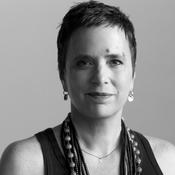Eve Ensler
I Feel, Therefore I Am
“How in our daily lives are we connecting with ourselves and everything around us? Because that’s where real, energetic transformation comes from.” Feminist playwright Eve Ensler speaks of the affirming physicality of our bodies, and of finding true contentment in the lives we already lead.
Guest

Eve Ensler is a Tony Award-winning playwright, performer, and activist. She is the author of The Vagina Monologues and The Good Body. Her memoir is In the Body of the World.
Transcript
KRISTA TIPPETT, HOST: Eve Ensler is best known for her play The Vagina Monologues, which has become a global force in the face of violence against women and girls. But she herself also had a violent childhood. And her lifelong work with the difficult, redemptive matter of female physicality came into relief in a new way when she was diagnosed with cancer in her fifties.
So in 2010, you are helping create something called the City of Joy in the Congo. And you discover that you have a huge malignant tumor in your uterus. You write that cancer landed in your body just as Congo had landed you “in the body of the world.” There’s something in your story — and I know you know this — that is iconic for this great contradiction of modern women, of most Western women maybe. On the one hand, we are attentive to our bodies and obsessed by our bodies, and yet it’s possible to not inhabit them and not even know that we’re not inhabiting them.
EVE ENSLER: Exactly.
MS. TIPPETT: And for you, this crusader for women’s bodies around the world to make that discovery is just remarkable.
MS. ENSLER: Well, I think everything’s in stages and is incremental. My whole life, if I look at the body of literature and theater pieces I’ve written, has been this huge journey and attempt to get back into my body. Every play on some level. But you think you’re in your body and then you get cancer. You wake up after nine hours of surgery with tubes and catheters and all kinds of things coming out of it, and you realize that it’s the first time in your life you’ve ever been in your body. You are a body. You are pure body. And that experience is so incredible. It was so incredible to be in my body, to not have this be an abstraction.
MS. TIPPETT: I’m also thinking a lot lately that Descartes has so much to answer for — his idea, “I think therefore I am.” Western culture is so built around this overly cerebral, disembodied way we’ve created all of our institutions, and we’re impoverished by it. We’re so much smaller for it.
MS. ENSLER: So much smaller. It’s so funny that you’re saying that, because during my cancer, I used to just chant all the time, “I feel therefore I am.” I’m in my body, therefore I can feel my existence. I feel the breath. I feel the living, breathing fiber that is humanness. This notion of objectivity — as if that were ever possible, as if the brain could somehow separate you from your subjective self — has created a level of dissociation on the planet. You can get yourself into a mind-set which keeps you from opening your heart.
MS. TIPPETT: I was at a gathering a couple of weeks ago and there were neuroscientists there and artists and poets — a poet from Sierra Leone, a poet from Northern Uganda. There were also contemplatives. And we talked about the Buddhist word for “heart-mind” — that heart and mind are the same thing. And when Western neuroscientists first started studying the brains of meditating Tibetan Buddhist monks, the monks thought this was so hilarious that they were putting the electrodes on the head …
MS. ENSLER: As opposed to the heart.
MS. TIPPETT: Yes. But actually, the science is also helping us understand that our brain is an organ, right? And that what we experience as feelings lodge in our bodies as well.
MS. ENSLER: And nothing’s separate. Again, everything got separated. But there’s a direct line that goes from and to, and that is, to me, the most exciting thing about being alive right now — rewiring ourselves and reconstituting ourselves to understand that this is all connected not only here, but outside of us. You can’t dominate people without separating them from each other and from themselves. The more people get plugged back into their bodies, into each other, the more impossible it will be for us to be dominated and occupied. I think that’s really the work right now, and I don’t mean that in a narcissistic way. I mean, how in our daily lives are we connecting in every single respect with ourselves and everything around us? Because that’s where transcendence comes from. That’s where real energetic transformation comes from.





